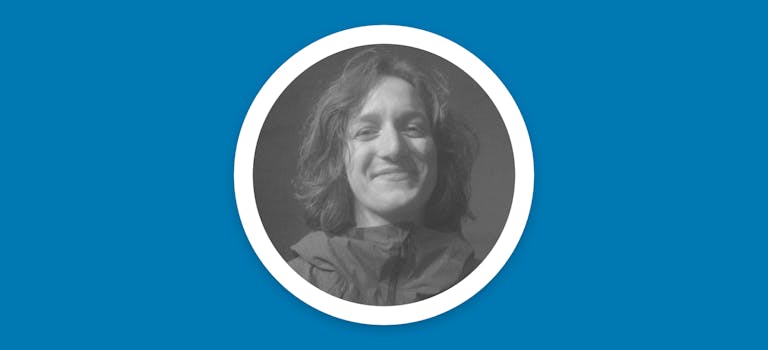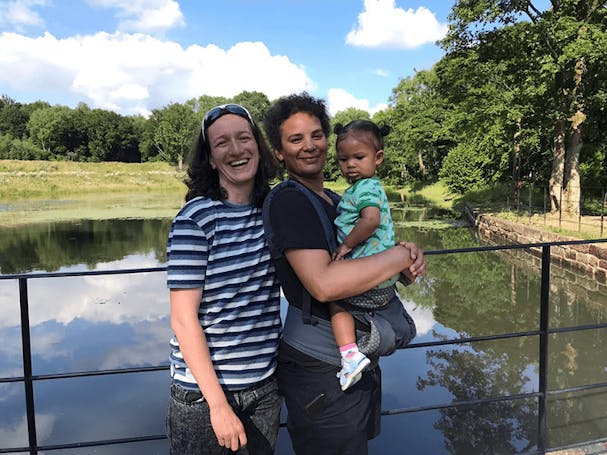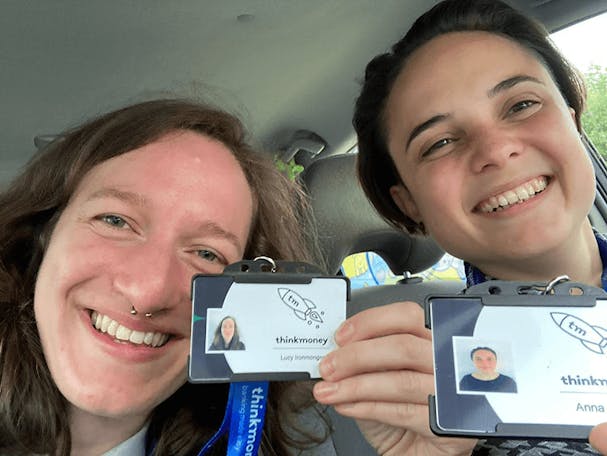
The Academy: Lucy’s time at thinkmoney as a new developer
14th Sep 2021
thinkmoney
Thanks for stopping by. My name is Lucy Ironmonger and I’ll be giving an insight into my first month working as a Foundation Developer at thinkmoney, and how I got here.
A bit about me
2020 was a whirlwind year for me. I was working full-time as an Operations Director for an electronic music school, and having my most stressful year at work by far due to the effects of Covid. My partner Vee and I had also bought our first house, which I’d fully gutted and renovated, just in the nick of time for Vee to give birth to our daughter, Asher, in July. I then did what anyone would do with all of that free time. I signed up for a six-month intensive coding bootcamp at Manchester Codes. Classic!
If 2020 taught me anything, it was what I wanted my working life to look like in 2021. By the time I’d reached the end of the bootcamp in March, I was certain that the sort of organisation I want to work in is:
- doing meaningful work;
- large enough so that I could work with bigger systems and teams;
- prioritising psychological safety and the people within it;
- understanding of my level and ability, especially since I’d just completed a bootcamp. Ideally, I’d want to go into a graduate programme where there was lots of training on the job.

Why thinkmoney?
Manchester Codes has a Slack Channel dedicated to jobseekers and when the opportunity was posted about thinkmoney, it caught my attention. Not just because it seemed to be a great fit, but because thinkmoney is a company that has changed our lives already.
Back when I started dating Vee, seven years ago, she had an extremely bad credit score due to a council tax bill that she couldn’t pay. She took out a payday loan to cover it, which only made matters worse due to their high interest rates. As a result, she was unable to open a current account or access any sort of finance until she discovered thinkmoney. After opening an account, bit by bit, her credit score began to improve. She was able to cover all her bills consistently and begin building up her savings. Goals that had seemed unthinkable due to bad credit now seemed possible and the thought of saving for a house started to seem less like a fantasy. Roll forward a few years, and I’m now sat in said fantasy house writing this blog post. The not so good news is she now has a credit score of 999, even better than mine! Gutted!
So yes, thinkmoney is a company that I knew I could fully get behind. They do real, impactful work with the services they offer, and can genuinely help customers get in control of their finances. When I watched the Lunch’n’Learn that was delivered by our Head of Engineering (Paul), Software Engineer Manager (Ehsan) and Lead QA Analyst (Sri) it was the deal-sealer. I was certain that this was the right fit. Test Driven Development (TDD), a big focus on the people, clean code and a carefully designed academy programme. Let’s go!
The interview
The interview process started with a 20-minute chat. Then, a week later, the second interview was almost fun, dare I say. I got to chat with Ehsan and Paul, along with Steve, Head of Acquisition and Robin, a lovely developer who had been in my shoes three years previously. It was split into a 45-minute chat, followed by a blind tech test, followed by a Q&A. The chats gave me an opportunity to ask them about the business roadmap, their plan for the developers on the academy and generally chat about concepts, such as clean code and TDD in more detail. The tech test was not my strong suit and I felt all fingers and thumbs, but despite this, they were all very reassuring and supportive.
My advice
My advice to junior developers is that you don’t need to know everything. Know your limitations and own them. You don’t want to be a bull in a China shop when you join, so to be able to talk about how clean code practices, pair programming, clear communication and TDD will help you achieve that. The goal isn’t for you to write tonnes of code (because you’re a programmer now, woo!). Your job is to add value to the business, leave the campsite cleaner than you found it (to quote Uncle Bob) and bring synergy to the team you’re in. Your time in front of VS Code is only one component of this.
So don’t just prepare katas (code exercises). Prepare competency questions, dig into the company’s goals and be extremely clear on why this role is right for you. Be curious about your long-term plan and ask questions to help you build that picture.
Tech tests are for talking. They want to understand your thinking, even if it’s, “I’m stuck… let me think about what’s next”. And if you can communicate the above concepts well, this can carry you even if the tech test doesn’t go to plan.
You ultimately want to get comfortable at being uncomfortable, as this is how you’ll grow. Putting yourself in an interview situation in front of four people for two-hours is a good start. So kudos to those doing this, it’s not easy but it is worth it.

My time at thinkmoney
On to the juicy stuff! Let’s go through the keyhole to my first month working at thinkmoney! I was lucky enough to start with three other lovely folks; Anna, Sofia and Ragini, so we have all had each other to bounce off.
Something that has struck me throughout my first month is how well organised thinkmoney is. I’m not just saying that. It really is. The onboarding process is something I didn’t realise could be done with such refinement, and what a big impact that would have on us feeling at ease.
Here are a few things that really hit home in making it an amazing experience:
- A giant box of Celebrations overfilling what was initially a fruit hamper, placed on our desk on day one. Big tick there! It took the whole team six days of consistent eating to get through it.
- A detailed plan mapped out for the first day, and then weekly plans for the first eight weeks, followed by monthly plans up to and beyond month six. Don’t think of this as being micro-managed, it isn’t that. It’s really good to have a realistic set of goals to understand what each week will bring and what new things you’ll be learning. It also helps you get a handle on the variety that’s involved which has been carefully curated by Ehsan. The onboarding plan is available to all, along with lots of guides for you to freely look through to get familiar with the systems.
- Meet & Greets with different teams, who have each been keen to help us understand how everyone fits together to make the dream work. You might think it’s overwhelming, but it’s really not when it’s spaced out over the course of a month… and they’re all really lovely folks!
- Any expectation you put on yourself as a junior developer of being ‘way down the pecking order’ and not wanting to trouble more senior colleagues gets completely dismantled on day one. Andy Leitch, the CTO, had a really good chat with each of us, asking questions about ourselves and our journeys. It didn’t feel forced, and while I could see the motivations of being closer to the Celebrations hamper, he really set the tone that our experience and input is valid, and that us getting settled into thinkmoney was everyone’s priority.
- Buddies! Just what you want when starting somewhere new, and a concept that I think should be rolled out on every spectrum. Someone you can turn to for things that you’re not sure on. My buddy was brilliant! Always eager to help, nothing was too much of a problem (or at least he tells me that!). Having him there to ask questions and to see what he’s working on has been great to help integrate me into the team. Each week we work on a kata and discuss the TDD approach in detail.
- Workshops. Having come into this role from a career change, I’ve never worked in tech before. This means that I hadn’t had any proper exposure to agile working, the software development lifecycle, the tools they use, Quality Assurance, etc. This was all new! So what better way to learn about these than to have workshops on them. It really helps ground us all very quickly, allowing us to participate and understand how these tools can help each team work towards the business goal.
- Agile working is how the company works, not just the engineering team but the company as a whole. The Software Engineering Manager has weekly one-to-ones with each of us and daily stand-ups. Any feedback from those is actioned immediately, and any improvements we suggest are discussed. Working in an environment like this with short feedback loops is really empowering, knowing that your voice is heard is something that you might think a big company could struggle with, so I’ve been pleasantly surprised on that.
- Did I mention the Celebrations hamper?
So, what does a week look like? A lovely combination of OutSystems learning (following the online tutorials and building things with it), meet & greets, katas with our buddies or sometimes mob programming with the other developers, workshops and open forums. All wrapped in a layer of calmness and trust. You can work yours to fit around your schedule too. Want to work from home sometimes? That’s typically fine (we’re also remote every Friday), although by coming into the office you benefit from the epic canteen food and the on-site personal trainers and gym. I know, right?
So that just about sums it up for my first month at thinkmoney. I’m so glad to be part of the team. If you’re a junior developer reading this and you’re interested in finding out more, do feel free to reach out to me on Twitter @lucyironmonger and I’d be happy to chat to you more about what life is like at thinkmoney. To all the people that have helped us settle in so far, thank you!
< Back to articles
